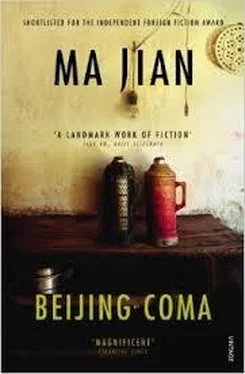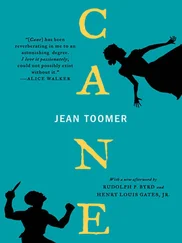‘We’re not in Mao’s era any longer, Old Fu,’ I said, hunching my shoulders against the cold. ‘At worst, you’ll be assigned a post in the border regions after you get your PhD.’
Sure enough, later that night, students returned to the Square to protest against the arrests. I could hear them shout, ‘Long live freedom! Release our fellow students!’
The slogans raised our spirits. Old Fu closed his eyes, let out a sigh of relief and said, ‘I can hear lots of girls’ voices out there. The police won’t be able to handle this situation much longer.’
Dawn approached. The sounds of protest outside had dwindled. The fire in the charcoal burner had gone out and the hall was getting colder again. Most of the students in the hall had dozed off, the rest were talking quietly among themselves. Two policemen had crawled onto a large table in the middle and fallen asleep under their heavy coats.
Then it was my turn to be questioned. I’d been counting the number of students who’d been called in by the interrogation officers. I was the thirty-fourth.
Your blood races onwards. The pulmonary artery warms as it pulsates. As regularly as a ticking metronome, oxygen-rich blood spurts through the heart’s aortic valve into the aorta.
My body carries me like a boat lost at sea… There is jade on the north side of the mountain, and animals that look like sheep but have no mouths. They live well without eating… As fresh blood flows through my motor cortex, scenes from the The Book of Mountains and Seas are replaced by images of Beijing University’s smoke-filled dorms.
When Old Fu and I returned to the campus after our release from detention, we were greeted like heroes. We didn’t have to pay for our food or drink for a week.
We two were the only science students who’d been forced to write self-criticisms. Zhuzi and some of his fellow law students were let off with a caution. But Hai Feng and ten social science students were detained in a suburban police station in Tongxian for three days. Shu Tong and Wang Fei regretted not being arrested. Chen Di was embarrassed by his cowardice. The night before the demonstration, he’d written WIPE OUT TYRANNY on his bamboo sleeping mat, but he’d been the first to flee the Square. Ke Xi claimed that he’d got stuck behind the police cordon outside the underpass exit.
Still fired with political zeal, we publicly burned copies of Beijing Daily featuring a biased report of our demonstration, and resolved to form an autonomous student union with its own independent magazine.
But a few days later, newspapers reported that Professor Fang Li, the dissident astrophysicist, had been expelled from the Party, together with the investigative journalist Liu Binyan and a poet called Wang Ruowang. Those three men were our spirituals leaders. They had dared to openly criticise the political system and call for change. Their courage had inspired us to take to the streets, but our protests had destroyed their careers.
Sensing a change in the political climate, the university authorities tightened discipline within the campus. Police vans were positioned around the Triangle. The posters on the bulletin boards were torn down. The university’s Party Committee visited our dorm and warned that any student who dared create more trouble would be handed over to the police.
News then leaked out that the reformist General Secretary, Hu Yaobang, had been forced to resign from his post for sympathising with the students’ demands. Deng Xiaoping, who was still the paramount leader, stated that the Party would take tough action against any future demonstrations and wouldn’t be afraid of bloodshed. Overnight, our gang of activists turned from being heroes to pariahs. Students like Big Chan and Mao Da who’d opposed our demonstration, blamed us for Hu Yaobang’s downfall.
A few days later, the People’s Literature magazine published Stick Out Your Tongue , an avant-garde novella by a writer called Ma Jian. The Central Propaganda Department denounced it as nihilistic and decadent, and ordered all copies to be destroyed, then proceeded to launch a national campaign against bourgeois liberalism. The hardliners in the Party were fighting back. They wanted a more open economy, but not the demands for political and cultural freedoms that it inspired. The brief period of tolerance had come to an end. It felt as though China had been put back ten years.
What angered me most though was that, after our demonstration, the government let the students off, but persecuted innocent bystanders. The Shandong peasant I met in the Square was sentenced to ten years in prison.
We spent the rest of 1987 in a state of nervous unease. I promised my mother that if I scored over 500 in the TOEFL exam, I’d give up my PhD and go abroad to study. My arrest had lost my mother a pay rise, and any chance of being granted Party membership.
The failure of our protests created disillusionment and apathy. Shu Tong said student politics were a waste of time, and that his plan now was to make some money, set up an independent university, and change China from within. Students went back to spending their spare time playing Mahjong, going dancing, or looking for part-time jobs. In the dorms, the girls talked about Italian shoes and Swiss watches, and the boys returned to discussing which of the female students were still virgins.
Your organs lie scattered inside your trunk like a disbanded army. Your body is a felled tree, decaying on the ground.
My mother is sorting through some objects on the end of my bed. The metal bedsprings creak and groan like a car engine that won’t start. She sniffs the air and mutters, ‘It stinks in here…’
I could never escape the stench of latrines at university. The only toilets in the block were right next to our dorm. There were just four squat toilets for the two hundred male students in the building. Day and night, people would traipse down the corridor to go and use them. I was always hearing the toilet doors being opened and slammed shut.
At Southern University, I used to sleep quite well. The nights there were silent. But at Beijing University, students would stay up late into the night listening to the radio or cassette tapes. My sleep was regularly interrupted by a muted babble of songs and news reports: ‘ When you come back to my small home town, how happy I will be … The new General Secretary Zhao Ziyang has submitted the plan for examination and approval… The acclaimed director, Zhang Yimou, lifted into the air the shining Golden Bear awarded for his film Red Sorghum … All I want is a home of my own. Doesn’t have to be a palace … China’s first test-tube baby was successfully delivered at Beijing Medical University today…’
A peasant from Sichuan lived in our corridor. We called him ‘the drifter’. He’d left his poverty-stricken village in the mountains and come to the capital, hoping to find work. One of the students in our block had taken pity on him at the train station and brought him back to the university. He sat in the corridor all day, drinking and swearing, and generally making a lot of noise. The student who’d befriended him had long since graduated, but those of us who remained felt obliged to continue giving him refuge.
At night the library and classrooms were locked up. The only place I could do some English revision in peace was beneath the lamp in the yard outside. I thought back longingly to my days at Southern University when I was able to share a private room with A-Mei.
‘Not even that girlfriend of yours can stand the smell of you,’ my mother grumbles. ‘It’s been months since she last visited.’
I have no memory of Tian Yi ever visiting me. Does that mean that there have been times when I’ve slipped out of consciousness?
Читать дальше












